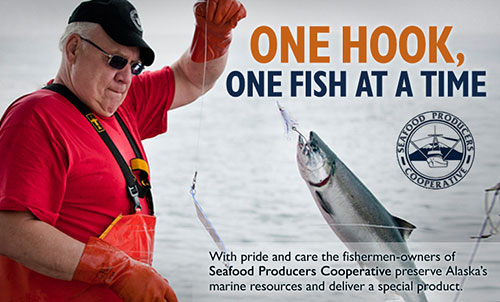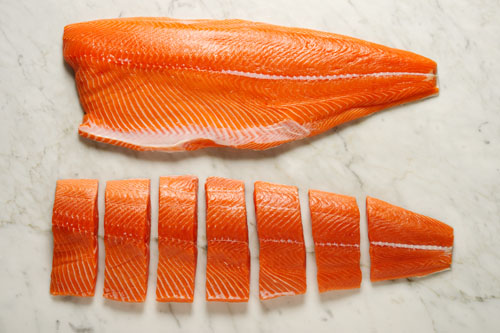
When you buy from a fishermen’s cooperative, you buy your fish from a fisherman. Your fish goes from the ocean to your plate in the most direct path possible. We, the fishermen, are the owners of the cooperative and take great pride in getting the best quality fish to our customers.
The fisherman’s life is notoriously a difficult one. Being at the mercy of the elements makes working together crucial. So we’ve banded together to make it easier. And that’s why we’re part of a cooperative, which just happens to be the oldest fishermen’s cooperative in North America.

When a fisherman tries to sell fish on his own, he faces three problems:
• Who does he get to process and package his fish?
• How does he get enough volume to scale so that his potential customers can rely on him always having enough to sell?
• How can he get enough money to solve the first two problems?
This is where a fishermen’s co-op comes in. A fisherman cooperative allows a fisherman to do what he does best—catch fish. A co-op can invest in processing and packaging facilities. A co-op can achieve enough scale so that customers don’t run dry. A co-op provides a safety net by allowing members to pool together and get things like vessel insurance or savings on gear purchases.
Co-ops have a unique way of doing business that offer fishermen the best of both worlds, giving us the opportunity to work independently, the way we fishermen work best, but while also providing a space for us to pull our resources together to achieve a bigger goal.
Here are the 7 Cooperative Principles used by co-ops around the world and how they apply to a fishermen’s cooperative like Seafood Producers Cooperative (SPC).
1. Voluntary and Open Membership Our fishermen’s co-op is open to fishermen who accept the responsibilities of membership and therefore share our values and follow our adherence to quality.
2. Democratic Member Control Our Fishermen’s Cooperative is managed by our members. We the fishermen are the owners and the members who vote to make important decisions about how to pursue our future.
3. Members’ Economic Participation Members contribute equally to, and democratically control, the capital of the cooperative. We fishermen decide how to invest capital. For example, pulling our capital together helps us get the most state-of-the-art cooling technologies and the best processing equipment available.
Since 1944, all investments—whether small or large, short- or long-term—have been made with one purpose, and that purpose is to better serve the needs of the cooperative’s members…the fishermen.
Being part of a cooperative helps members save as much as possible on gear purchases, vessel costs and insurance. As a cooperative, the whole is better than the sum of the parts.
Generations of SPC fishermen have benefited from the stability that the cooperative offers us. We fishermen are living a unique way of life—a rugged, independent life. Co-ops have a unique way of business that offers us the best of both worlds, giving us the opportunity to work independently, the way we fishermen work best, but also allowing us to band together to get the latest equipment to help us produce the best fish possible. Being part of a co-op makes our dreams possible.
4. Autonomy and Independence Cooperatives give us fishermen the autonomy and independence we enjoy out on the seas. We are the captains of our destiny and we make decisions to support each other. As a co-op of hook-and-line fishermen, we work on a smaller scale and have a deeper connection with the ocean than larger corporations that use mass extraction methods. We revere traditional approaches to fishing that don’t do long-term damage to fisheries and the ocean. Working on a smaller scale means that we can be more transparent. We can look customers in the eye and tell them where we fished and how we fished.
5. Education, Training and Information Our fishermen’s cooperative provides education and training to our members on how to process fish with the strictest adherence to quality standards. Our Frozen-At-Sea (FAS) educational program gives our members key insights into how to produce the highest quality fish. SPC holds the highest standards of its members and makes it possible for all members to share techniques so that together we can achieve the highest standards of quality.
6. Cooperation among Cooperatives As a fishermen’s cooperative, it’s important for us to work with other co-ops. We believe it’s important to bring our high quality fish to food co-ops and we will work with other co-ops to help us all achieve bigger goals.
7. Concern for Community We have and will generously offer fish and/or time to causes in the communities within which we work that align with our values. Such causes include work with the Nooksack Salmon Enhancement Association, the Sitka Seafood Festival, and the Southeast Alaska State Fair.
Our concern for community extends to how we fish. As a cooperative of hook-and-line fishermen, we use a method that is more sustainable than the mass extraction methods used by many other companies.
In addition to our sustainable methods of fishing, we are also the “eyes of the ocean.” SPC members like Dick Curran use their vessels to clean up the ocean in a further effort to be good stewards of the resource that provides for their livelihood. Dick and his family—partner Tory and her two daughters—use their F/V Cherokee to participate in the Marine Conservation Alliance Foundation Marine Debris Cleanup project with the support of SPC. During the break between fishing the Gulf of Alaska and before outfitting for the Chatham black cod fishery, Dick and his family have removed nearly 30,000 pounds of plastics and marine debris from remote coastal beaches that would have been harmful to local wildlife.
This sort of concern for community is what cooperatives are all about. SPC’s dedication to cooperating with causes that matter, the communities within which we work and with other like-minded organizations embodies the spirit of cooperatives.
—Look for fresh, frozen and canned SPC fish at your local food co-op or order it online at www.alaskagoldbrand.com.


